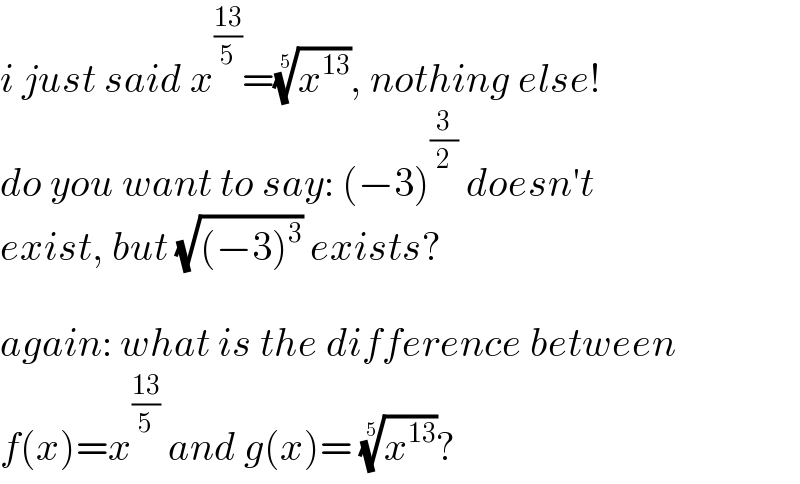
Question Number 171318 by sciencestudent last updated on 12/Jun/22

$${if}\:{f}\left({x}\right)={x}^{\frac{\mathrm{13}}{\mathrm{5}}} \:{and}\:{g}\left({x}\right)=\sqrt[{\mathrm{5}}]{{x}^{\mathrm{13}} }\: \\ $$$${Which}\:{one}\:{is}\:{correct}? \\ $$$$\left.\mathrm{1}\left.\right)\:{f}\left({x}\right)={g}\left({x}\right)\:\:\:\:\mathrm{2}\right){f}\left({x}\right)\neq{g}\left({x}\right) \\ $$
Commented by mr W last updated on 12/Jun/22

$${x}^{\frac{\mathrm{13}}{\mathrm{5}}} =\sqrt[{\mathrm{5}}]{{x}^{\mathrm{13}} } \\ $$
Answered by mathlove last updated on 14/Jun/22

$${chek}\:{this}\:{Mr}\:{W} \\ $$$$\therefore{f}\left({x}\right)={g}\left({x}\right)\Rightarrow{D}_{{f}} ={D}_{{g}} \:{and}\:{R}_{{f}} ={R}_{{g}} \\ $$$${D}_{{f}} =\left[\mathrm{0},\infty\right)\:\:\:\:\:{and}\:{D}_{{g}} ={R} \\ $$$${D}_{{f}} \neq{D}_{{g}} \Rightarrow{f}\left({x}\right)\neq{g}\left({x}\right) \\ $$
Commented by mr W last updated on 14/Jun/22

$${what}'{s}\:{the}\:{difference}\:{between} \\ $$$${x}^{\frac{\mathrm{13}}{\mathrm{5}}} \:{and}\:\sqrt[{\mathrm{5}}]{{x}^{\mathrm{13}} }?\:{if}\:{they}\:{are}\:{different}\:{to} \\ $$$${you},\:{then}\:{x}^{\frac{\mathrm{1}}{\mathrm{3}}} \neq\sqrt[{\mathrm{3}}]{{x}}\:{to}\:{you}\:{too}! \\ $$
Commented by mathlove last updated on 15/Jun/22

$${is}\:\left(−\mathrm{3}\right)^{\frac{\mathrm{3}}{\mathrm{2}}} =? \\ $$
Commented by mathlove last updated on 15/Jun/22

$$\left(−\mathrm{3}\right)^{\mathrm{1}} =−\mathrm{3}\Rightarrow\left(−\mathrm{3}\right)^{\frac{\mathrm{2}}{\mathrm{2}}} =\left(\left(−\mathrm{3}\right)^{\mathrm{2}} \right)^{\frac{\mathrm{1}}{\mathrm{2}}} =\left(\mathrm{9}\right)^{\frac{\mathrm{1}}{\mathrm{2}}} =\sqrt{\mathrm{9}}=\mathrm{3} \\ $$$$?−\mathrm{3}=\mathrm{3} \\ $$
Commented by mr W last updated on 15/Jun/22

$${i}\:{just}\:{said}\:{x}^{\frac{\mathrm{13}}{\mathrm{5}}} =\sqrt[{\mathrm{5}}]{{x}^{\mathrm{13}} },\:{nothing}\:{else}! \\ $$$${do}\:{you}\:{want}\:{to}\:{say}:\:\left(−\mathrm{3}\right)^{\frac{\mathrm{3}}{\mathrm{2}}} \:{doesn}'{t} \\ $$$${exist},\:{but}\:\sqrt{\left(−\mathrm{3}\right)^{\mathrm{3}} }\:{exists}? \\ $$$$ \\ $$$${again}:\:{what}\:{is}\:{the}\:{difference}\:{between} \\ $$$${f}\left({x}\right)={x}^{\frac{\mathrm{13}}{\mathrm{5}}} \:{and}\:{g}\left({x}\right)=\:\sqrt[{\mathrm{5}}]{{x}^{\mathrm{13}} }? \\ $$
Commented by mathlove last updated on 15/Jun/22

$${understand}\:{they}\:{are}\:{both}\:{equle} \\ $$
